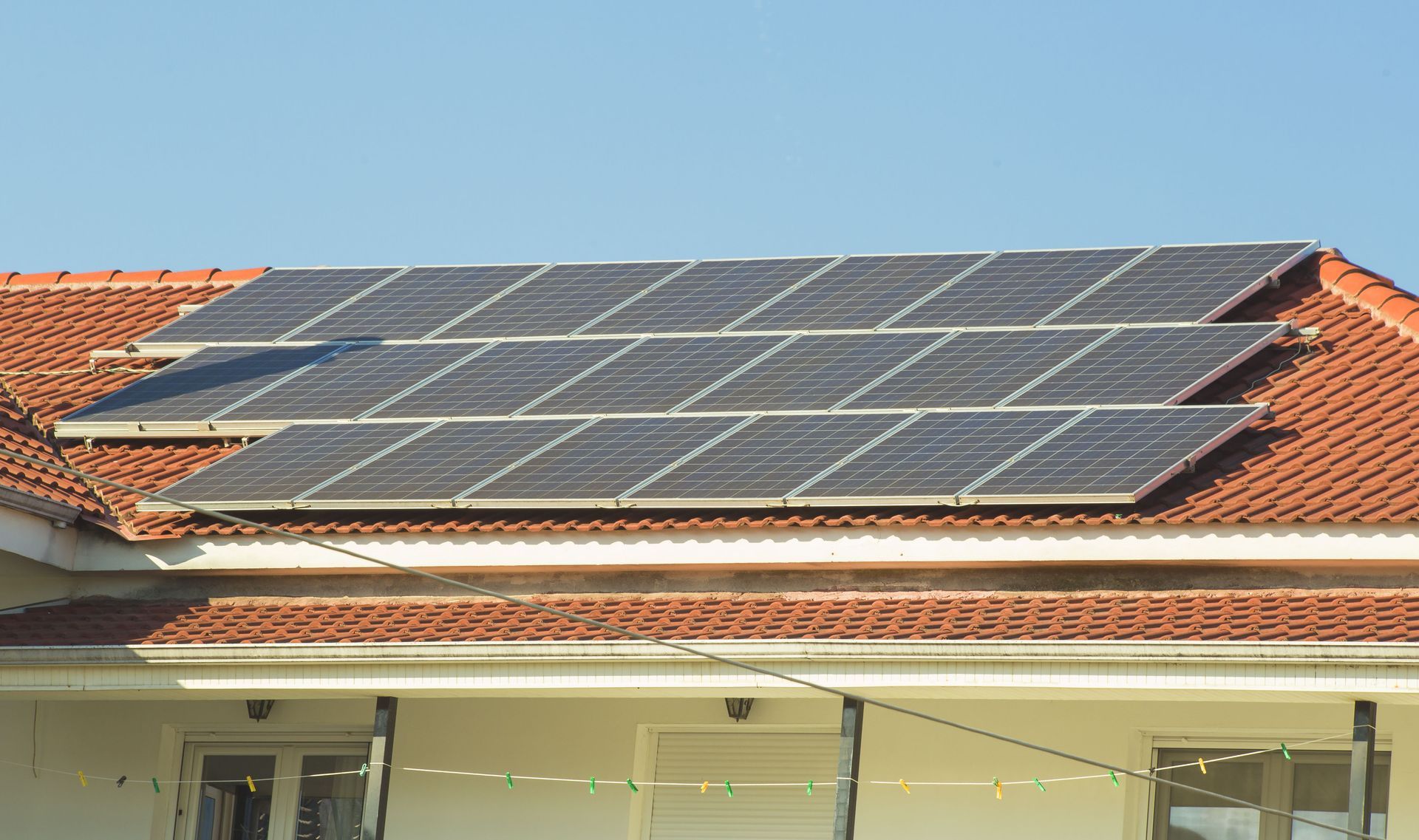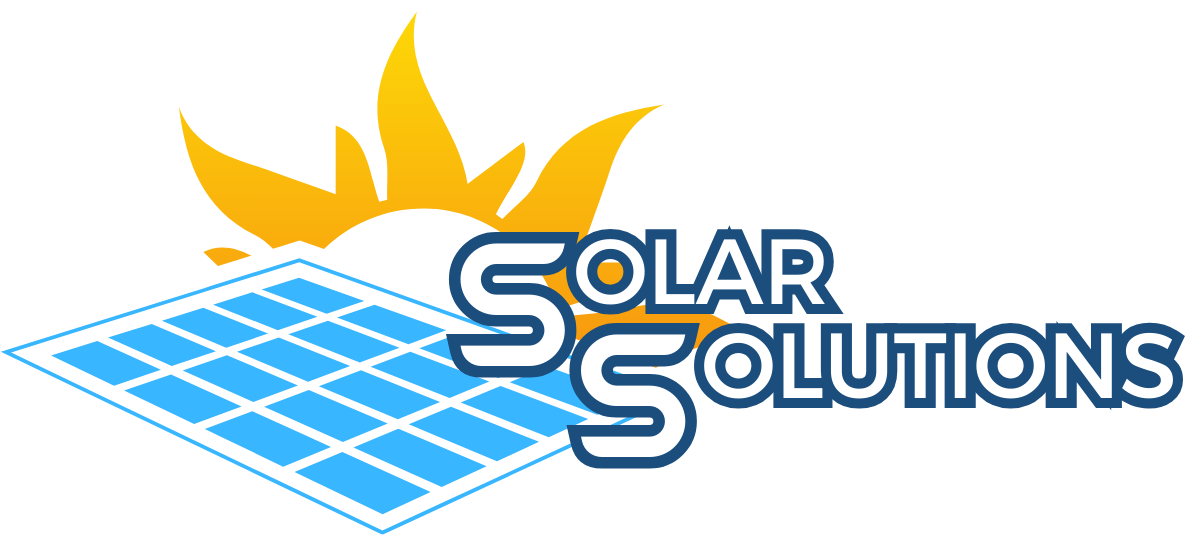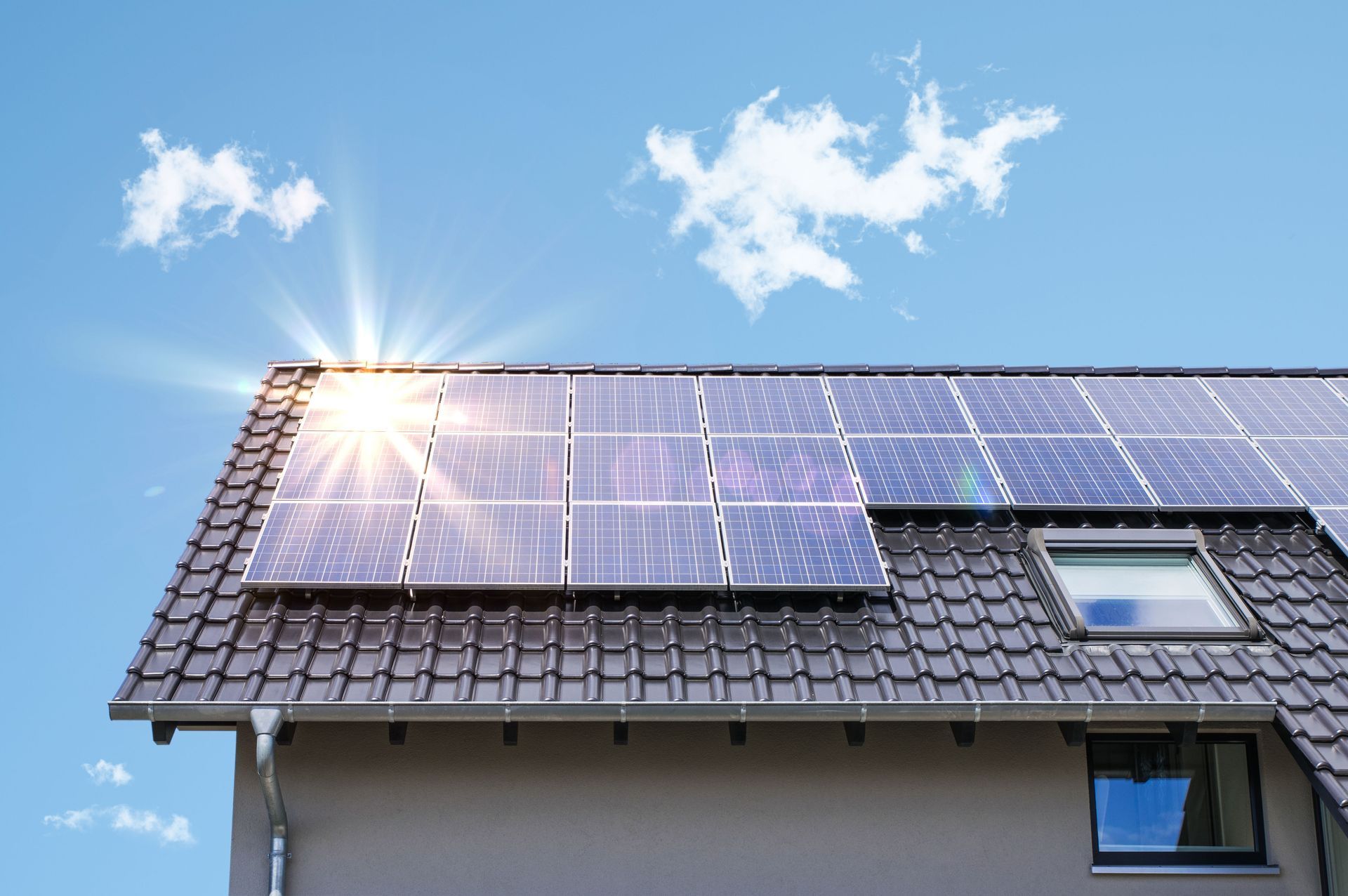Blog
Blog
Solar Solutions Inc

By Solar Solutions
•
September 11, 2024
Solar energy has become an increasingly popular choice for homeowners looking to save on energy costs and reduce their environmental impact. If you’ve ever wondered how solar energy works for your home, you’re not alone. The process is simpler than you might think, and understanding it can help you make informed decisions about whether to invest in solar panels. Here’s a breakdown of how solar energy powers your home and the key components involved. 1. Solar Panels: Capturing the Sun’s Energy The journey to powering your home with solar starts with solar panels. These panels are made up of photovoltaic (PV) cells, which are designed to capture sunlight and convert it into electricity. When sunlight hits the solar cells, it knocks electrons loose from their atoms, creating a flow of electricity. This process is called the photovoltaic effect. Most residential solar panels are installed on the roof where they can capture the most sunlight. Depending on your home’s location and roof angle, your panels will absorb varying amounts of sunlight throughout the day, producing electricity whenever the sun is shining. 2. Inverter: Converting Solar Energy to Usable Power The electricity generated by the solar panels is direct current (DC) electricity. However, your home uses alternating current (AC) electricity to power appliances, lights, and other devices. This is where the inverter comes in. The inverter’s job is to convert the DC electricity produced by the panels into AC electricity that can be used throughout your home. Inverters are either installed as a single central unit or as smaller microinverters attached to individual panels. Either way, they play a crucial role in making the solar power usable. 3. Electrical Panel: Distributing Power to Your Home Once the inverter converts the electricity into usable AC power, it is sent to your home’s electrical panel, also known as the breaker box. The electrical panel is responsible for distributing electricity throughout your home, sending power to your lights, appliances, and outlets. Essentially, your solar energy system integrates with your home’s existing electrical infrastructure, providing clean energy in the same way traditional utility electricity would. 4. Net Metering: What Happens to Excess Energy? If your solar panels generate more electricity than your home needs, the excess energy doesn’t go to waste. In many states, including Florida, you can take advantage of net metering. Net metering is a system that allows homeowners to send any surplus electricity back to the grid in exchange for credits on their utility bill. These credits can be used when your solar panels aren’t generating enough electricity, such as at night or on cloudy days. Essentially, your home remains connected to the grid, but you’ll be able to rely on your solar system for the bulk of your energy needs, only drawing from the grid when necessary. This helps balance energy production and consumption while maximizing your savings. 5. Battery Storage: Storing Extra Energy In addition to net metering, some homeowners opt to install solar batteries to store excess energy generated by their panels. With a battery system, you can store unused electricity for later use, providing additional energy security during power outages or at night when your panels aren’t producing power. While solar batteries add to the overall cost of your system, they can be a valuable addition, especially for those looking to achieve energy independence and avoid utility costs entirely. 6. How Solar Saves You Money One of the most attractive aspects of going solar is the financial savings. Solar panels allow you to generate your own electricity, reducing your reliance on the grid and lowering your monthly utility bills. Depending on the size of your system and your home’s energy usage, you could save between 50-90% on your electricity costs. In addition to immediate savings, solar panels can increase the value of your home. On average, homes with solar systems sell for more than those without, making solar a solid long-term investment. 7. Environmental Benefits Aside from the financial perks, solar energy offers significant environmental benefits. Solar is a renewable energy source that doesn’t produce harmful emissions like fossil fuels. By switching to solar, you can reduce your home’s carbon footprint and contribute to a more sustainable future. In conclusion, solar power works by capturing sunlight through solar panels, converting it into usable electricity with an inverter, and distributing that energy throughout your home via your electrical panel. Any excess energy can be sent back to the grid through net metering or stored in batteries for later use. By reducing your reliance on the grid, you can save money, increase your home’s value, and contribute to a cleaner environment. If you’re considering making the switch to solar, understanding how the system works can help you make the most of your investment.

By Solar Solutions
•
September 11, 2024
Investing in solar panels for your home or business is a big decision, and one of the most attractive aspects is the long-term financial benefits. Solar panels come with upfront costs, but once they're paid off, the financial rewards truly begin to shine. So, what exactly happens when you finish paying off your solar panels? Let’s explore the key advantages and financial freedom that come with this milestone. 1. Significant Savings on Energy Bills The biggest benefit of paying off your solar panels is that you essentially start generating free electricity. Once your system is fully paid for, the energy produced by your solar panels no longer has a financial cost attached to it. This means that, month after month, you’ll continue to power your home using the sun’s energy without the burden of paying for it. In Florida, where energy rates average around 14 cents per kilowatt-hour (kWh), the savings can add up quickly. Depending on the size of your system, you could see a reduction in your monthly utility bill by 50-100%, leading to significant long-term savings. For many homeowners, this means saving thousands of dollars over the lifespan of their solar panels, which typically lasts 25-30 years. 2. Maximizing Your Return on Investment Paying off your solar panels also means you've achieved a key financial goal—your return on investment (ROI). The payback period for solar systems typically ranges from 7 to 12 years, depending on factors like system size, electricity consumption, and local incentives. Once the system is paid off, the savings generated by your solar panels go straight into your pocket. With no more loan payments or financing costs to worry about, every dollar you save on electricity now contributes directly to your overall financial well-being. In fact, over the remaining lifespan of your system, you could see a return of several times your original investment. 3. Net Metering: Selling Excess Energy If your solar panels produce more energy than your home consumes, many states, including Florida, offer net metering programs. With net metering, any excess energy your system generates can be sold back to the grid in exchange for credits on your utility bill. This means that even if you aren’t using the electricity at the moment it's generated (like during the day when you’re at work), you can still benefit financially. After your solar panels are paid off, the income from selling excess energy can further boost your savings. Essentially, you could be paid for the energy you produce, adding another layer of financial benefits after the payback period. 4. Increased Home Value Without Higher Taxes Solar panels can increase the value of your home by an estimated 4-6%, making your property more attractive to potential buyers. Once your solar system is paid off, you not only enjoy free electricity, but your home’s value could also increase, giving you an edge in the real estate market if you ever decide to sell. In Florida, solar systems are also exempt from property tax increases, so while your home’s value may rise, your property taxes won’t. This exemption, combined with the long-term energy savings, makes paying off your solar panels an even smarter investment. 5. Environmental Benefits Continue Beyond the financial advantages, paying off your solar panels means you’ll continue to contribute to a cleaner, more sustainable environment. Solar energy is a renewable resource that produces no harmful emissions, helping to reduce your carbon footprint. Over the lifespan of your system, you’ll have made a significant impact on reducing greenhouse gas emissions and promoting energy independence. 6. Minimal Ongoing Costs After your solar panels are paid off, the ongoing costs are minimal. Solar systems are known for their durability and typically require little to no maintenance. Most systems come with warranties that last 25 years or more, covering any necessary repairs. Aside from occasional cleaning to remove debris and dirt, your solar system should continue to run efficiently for decades without much additional cost. In conclusion, when you finish paying off your solar panels, you unlock the full financial potential of your solar investment. You’ll enjoy significant savings on your energy bills, potentially earn money through net metering, and see an increase in your home’s value—all without worrying about property tax hikes. With free electricity powering your home and minimal ongoing costs, the decision to invest in solar becomes even more rewarding after the payback period. If you’re considering solar or are nearing the payoff stage, you’re on the path to long-term savings, energy independence, and environmental sustainability.

By Solar Solutions
•
September 11, 2024
One of the most common questions homeowners and businesses ask when considering solar energy is: How long will it take for solar panels to pay for themselves? In Florida, with its abundant sunshine and favorable incentives, solar panels can pay for themselves relatively quickly. While the exact payback period can vary based on a number of factors, it typically falls between 6 to 10 years. Let’s break down the key components that affect this timeline. 1. Initial Cost of Solar Panels The upfront cost of installing solar panels is a critical factor in determining how long it will take for them to pay for themselves. In Florida, the average cost of a solar panel installation ranges between $10,000 to $25,000, depending on the size of the system, the quality of the equipment, and the installer. This initial cost may seem high, but several financial incentives make solar more affordable. The federal Solar Investment Tax Credit (ITC) allows homeowners to deduct 30% of the installation cost from their federal taxes. Florida also offers a sales tax exemption for solar energy systems, and you won’t see a property tax increase from the added home value solar panels provide. 2. Energy Savings The primary way solar panels pay for themselves is through savings on your electricity bills. Florida’s residents pay an average electricity rate of about 14 cents per kilowatt-hour (kWh), and utility bills can easily add up, especially in the hot summer months when air conditioning usage spikes. Solar panels generate free electricity by converting sunlight into energy, allowing homeowners to significantly reduce, or in some cases eliminate, their monthly electric bills. The amount of savings depends on the size of the solar system, your home’s energy usage, and how much sunlight your property receives. In sunny Florida, solar panels can generate enough energy to cover 70-100% of a household’s electricity needs. On average, homeowners in Florida save between $800 to $2,500 annually on their utility bills after going solar. These savings compound over time and contribute directly to the payback period. 3. Net Metering in Florida Another factor that influences the payback period is net metering. Florida has favorable net metering policies, which allow homeowners to sell any excess electricity their solar panels generate back to the grid. This means that if your solar system produces more energy than your home uses during the day, you can receive credits from your utility company that further reduce your energy bill. Net metering can significantly shorten the payback period, especially in months when solar energy production is high, like during Florida’s long summer days. 4. Maintenance and Lifespan of Solar Panels Solar panels are extremely durable and typically require minimal maintenance over their lifetime. Most solar panels come with a 25-30 year warranty, and while they may lose a small amount of efficiency over time, they continue to generate electricity for decades. The low maintenance costs associated with solar systems mean that, after the initial installation, there are few ongoing expenses. With these systems lasting for 25 years or more, and payback occurring within the first 6 to 10 years, homeowners have the potential to enjoy more than a decade of free electricity once the system is paid off. 5. Additional Incentives and Future Savings In addition to the federal tax credit, solar systems in Florida are exempt from property tax increases. This means that even though solar panels can increase the value of your home by about 4-6%, you won’t face higher property taxes because of it. The financial benefits of solar go beyond just reducing your electric bill—they can increase your home’s value and make it more attractive to potential buyers if you decide to sell. In conclusion, the average payback period for solar panels in Florida is 6 to 10 years, depending on the system size, energy consumption, and other factors like incentives and net metering. Given that solar panels last 25 to 30 years or more, homeowners can enjoy substantial savings and potentially decades of free electricity once the system is paid off. With Florida’s abundant sunshine and supportive policies, investing in solar is a smart decision that not only helps the environment but also provides long-term financial benefits. If you’re considering solar for your home or business, now is the perfect time to take advantage of the available incentives and start saving.

By 7012730065
•
September 11, 2024
Tampa, Florida, is known for its abundant sunshine, making it a prime location for homeowners and businesses considering solar energy. But with the initial costs of installation and ongoing maintenance, many wonder: Is solar really worth it in Tampa? The short answer is yes. Let’s dive into the reasons why investing in solar energy in this sun-soaked region makes financial, environmental, and practical sense. 1. Abundant Sunshine in Tampa Tampa receives an average of 246 sunny days per year, which is well above the national average of 205 days. This consistent sunshine provides ample energy production from solar panels, meaning homeowners and businesses can generate more electricity and, consequently, see higher savings on their energy bills. Solar panels work by converting sunlight into electricity, so the more sunlight they receive, the more electricity they generate. In a place like Tampa, where sunshine is plentiful year-round, the panels will consistently produce energy, reducing dependence on traditional utility companies. 2. Financial Savings on Energy Bills Electricity prices in Florida are steadily rising, with an average residential electricity rate of about 14 cents per kilowatt-hour (kWh) in 2024. Installing solar panels allows homeowners to offset a significant portion of their energy consumption, drastically reducing monthly utility bills. In many cases, homeowners who install solar panels in Tampa can see their energy bills drop by 50-90%. Additionally, with net metering policies in place, any excess energy produced by your solar system can be sold back to the grid, further increasing your financial savings. Over the 25-30 year lifespan of most solar panels, the savings can amount to tens of thousands of dollars. 3. Federal and State Incentives The cost of solar installation has significantly dropped in recent years, and when paired with federal and state incentives, it becomes even more affordable. The federal government offers the Solar Investment Tax Credit (ITC), which allows homeowners to deduct 30% of the cost of installing a solar energy system from their federal taxes. Florida also provides property tax exemptions for solar installations, meaning that any increase in home value from solar panels won’t increase your property taxes. There is also a sales tax exemption on solar equipment, further reducing the upfront costs. 4. Increase in Home Value Solar panels can increase the value of your home. Studies have shown that homes with solar systems sell for more than homes without. In Tampa, where energy efficiency and sustainability are becoming more important to homeowners, having a solar system can make your home more attractive to potential buyers. A solar installation can increase home value by around 4-6%, providing a solid return on investment if you ever decide to sell. 5. Environmental Benefits Solar energy is a clean, renewable resource, meaning it doesn’t produce harmful emissions that contribute to climate change or pollution. Tampa, like many other areas, is susceptible to the impacts of climate change, such as rising sea levels and extreme weather events. By installing solar panels, you can reduce your carbon footprint and contribute to a more sustainable future for the region. In conclusion, with Tampa’s abundant sunshine, rising energy costs, and generous financial incentives, installing solar panels is an investment that pays off in both the short and long term. The combination of savings on utility bills, increased home value, and environmental benefits make solar energy not only worth it in Tampa but an increasingly popular choice for residents looking to make a smart, sustainable investment. If you're considering making the switch to solar, now is the time to take advantage of the opportunities Solar Solutions offers.
Business Hours
Hours:
- Mon - Fri
- -
- Saturday
- -
- Sunday
- Closed
Nights and Weekends by Appointment Only
License #CFC1431719
License #EC13011713
Hi. Do you need any help?
Privacy Policy
| Do Not Share My Information
| Conditions of Use
| Notice and Take Down Policy
| Website Accessibility Policy
© 2025
The content on this website is owned by us and our licensors. Do not copy any content (including images) without our consent.






Share On: